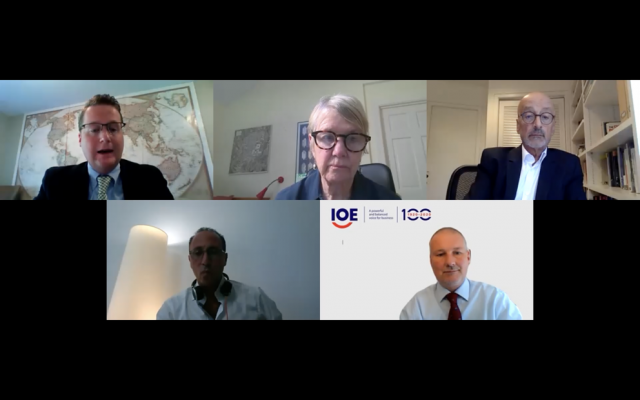 Around the world, governments, citizens and businesses are working to end to the COVID-19 pandemic. That’s a difficult task, and it requires high levels of cooperation. It is also important to note that, as the pandemic drags on, some areas are being hit harder than others. It’s been a particularly tough time in the Middle East and North Africa region, where countries were already seeing sluggish economic growth even before the pandemic.
Around the world, governments, citizens and businesses are working to end to the COVID-19 pandemic. That’s a difficult task, and it requires high levels of cooperation. It is also important to note that, as the pandemic drags on, some areas are being hit harder than others. It’s been a particularly tough time in the Middle East and North Africa region, where countries were already seeing sluggish economic growth even before the pandemic.
But this crisis is giving the business community an opportunity to lead in innovative ways. Recently, the Center for International Private Enterprise, the U.S. Chamber of Commerce, AmCham MENA, and Business Partners to Convince (BP2C) teamed up to host a discussion to help explain how the private sector, working together, is responding to COVID-19.
In the MENA region, “we’ve seen the business community step up and provide solutions in various and, frankly, remarkable ways,” CIPE’s Steve Rosenlund, CAE explained. “This has included finding ways to operate while also protecting public health, advocating for tax relief and stimulus spending that is keeping businesses afloat, and driving digital transformation.” Still, the MENA region is struggling to get ahead of the Delta variant.
This crisis is giving the business community an opportunity to lead in innovative ways.
While cooperation is important, everyone involved in the discussion — including experts from the BP2C coalition, Pharmaceutical Research and Manufacturers of America (PhRMA), AmCham MENA, and the International Organisation of Employers — agreed that vaccine distribution is key.
“The only way to get out of the contagious loop and boost our economic recovery, getting people back to work, schools, and getting their businesses running again is through vaccinations,” Mohammed Bataineh, the chairman of AmCham MENA, told the gathering. Yet too many in the region are hesitant. For example, Jordan and Kuwait have the lowest rates of vaccine acceptance globally, Bataineh added. Raising awareness that the COVID vaccines are safe and effective will be a crucial job in the months ahead.
BP2C, of which CIPE is a member, is working to raise that awareness. The coalition offers resources to encourage vaccinations in the workplace. It notes that “business is a trusted source of information, well suited to engage, inform and educate workers, their families and communities with a message that inspires confidence in vaccination and encourages acceptance and uptake as COVID-19 vaccines become available.”
Raising awareness that the COVID vaccines are safe and effective will be a crucial job in the months ahead.
Abby Shapiro, Executive Vice President of the U.S. Council for International Business, highlighted the coalition’s Web page, which focuses on the role of business partners, cites case studies, and provides partner resources. She adds that “the private sector and employers have a critical role to play” in overcoming COVID-19, and BP2C is ready to help.
Another group that is actively engaged in the push to increase vaccinations and was part of this discussion is PhRMA. “I’m happy to say that we are starting to win the fight,” Samir Khalil, Executive Director for the Middle East and Africa, said. He adds that his group is moving quickly, with 267 active clinical trials for vaccines underway, 4.4 billion vaccine doses already administered, and 1,606 unique therapies still in clinical trials.
Business can help overcome vaccine hesitancy by making shots available at work.
Matthias Thorns, Deputy Secretary-General of the International Organization of Employers, talked about the ways that employer organizations are key actors in societies. “Employers have made huge efforts to adapt to the pandemic, to ensure that businesses survive, and that the health and wellbeing of workers are protected,” he said. It’s key that “workplaces can be considered safe places by employees, making them confident about getting vaccinated there,” he added. Business enjoys the trust of its workers, but companies should be informing workers about vaccines, not manipulating them. “It’s about giving them the information they need to make a rational decision.”
Finally, Magued el Sayed, Head of Market Access, Pricing, and Government Relations at Sanofi, explained that “hesitancy is not because of the vaccine sometimes, it is because of the surrounding environment.” He says many people may not be willing to travel far or enter crowded spaces to get vaccinated. Thus, business can help overcome vaccine hesitancy by making shots available at work.
As the virus spread around the world last year, scientists worked on developing a vaccine, and governments worked on promoting healthy approaches. Now, more than a year into the pandemic, business is working to deliver ways to safely reopen and return the economy to full strength. CIPE and its partners in the business association and chamber community are working to drive that process forward, in MENA and around the world.
Watch the entire panel discussion here.
Published Date: August 31, 2021
